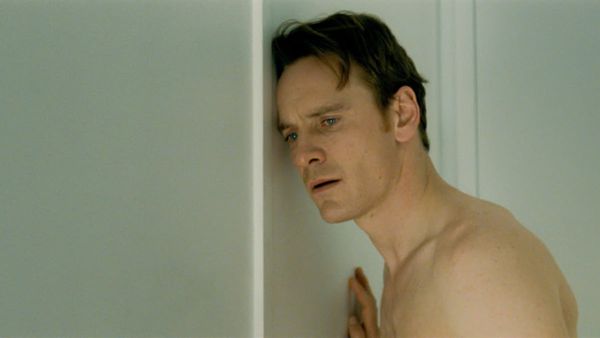Eye For Film >> Movies >> Shame (2011) Film Review
Shame
Reviewed by: Anton Bitel

A call girl stands by a bedside table and begins removing her undergarments. "Slowly," insists Brandon (Michael Fassbender), as he takes in every detail from the bed.
This scene, coming near the beginning of Steve McQueen's Shame, certainly advertises the film's focus on Brandon's hyperactive sex life. He will be repeatedly seen having sexual encounters, presented economically but nonetheless explicitly, with strangers, prostitutes and bar pickups, or else just masturbating to pornographic magazines, erotic websites or his own imagination.

He is an addict, obsessed with every aspect of eros – apart from intimacy, which terrifies him. His insatiable sexuality is a secret that he keeps closeted and concealed within the otherwise orderly routines of his yuppified life, the clean surfaces of his New York apartment and the immaculate way that he wears his clothes – but like the Atlantic that we eventually see stretched out beneath his bedroom window, his desire is dark, boundless and never-ending, with depths to it that are merely implied rather than actually seen.
The plot here is as minimalist as the interior of Brandon's apartment. His carefully controlled life of work and sex is thrown into turmoil by the unexpected arrival of his sister Sissy (Carey Milligan), an itinerant chanteuse whose intense neediness clashes with Brandon's veneer of cool aloofness while exposing his own vulnerability. Both siblings bear scars from their childhood, and both will acquire more, as they struggle either to confront or to repress a shared history that can never fully go away.
Shame, however, is not interested in the grand melodramatics of plot, in shrill revelations of past abuse or in sweeping redemptive arcs. Instead, narrative takes a back seat here as McQueen directs his film with the same savouring scrutiny with which Brandon directs the call girl.
For Shame is a slow, slow striptease – and even if Brandon is in fact nude, albeit half-covered by a sheet, right from his opening scene, every layer of his compulsive behaviour will gradually be unpeeled for examination with the sort of "attention to detail" that Brandon's boss David (James Badge Dale) commends. In this light, even that staple of pornography, a three-way, can be seen anew as an act of ecstatic anguish and self-torment.
Sean Bobbitt's camera may register, woozily, all the different positions, all the ins and outs of licentious congress, but the focus on Brandon's face, his misery, horror and despair, tells a different story. Brandon does not so much take pleasure in sex as abandon himself to it and even punishes himself with it.
On a dinner date, work colleague Marianne (Nicole Beharie) asks Brandon why it is that a man like himself – smart, attractive, single - is not seeing anyone at the moment. "It's just the way it is," Brandon responds – and those words encapsulate the faultline along which Shame will either win or lose its viewers. Some no doubt will be thrilled by McQueen's similar evasion of a straightforward answer to the question 'why?' when it comes to Brandon's character and conduct. There is an answer of sorts, hinted at here and there in the dialogue (and in the title), but McQueen is more interested in consequences than causes, in the damage done rather than the original sin. Others, however, may find Brandon's ordeal too free-floating, too detached from any obvious context, to be truly interesting or insightful.
The problem, ultimately, with McQueen's stripped-down approach is that, in giving so little away, he leaves you wondering whether there really is so very much substance to all the pain and passion on display – and while there may be impressive subtlety to the way that McQueen suppresses the precise details of Brandon's formative history, few would recognise similar restraint in Brandon's subsequent baroque breakdown on a rainswept wharf. So overstated a crisis demands motivation, but viewers will be left as unsatisfied, at least in this respect, as Brandon himself.
Fortunately, the accomplished filmmaking artistry already seen in McQueen's feature debut Hunger elevates Brandon's alienation and agony to rapturously aesthetic heights, while the performances of Fassbender and Mulligan match an extraordinary emotional rawness to their occasional physical nakedness. It is so very well made that one can only wish there were a little more to it than the fleshy mechanics of trauma. It is a film to admire greatly, but not truly enjoy – much like Brandon's attitude to the call girl. Shame, really – but it's just the way it is.
Reviewed on: 25 Oct 2011



















